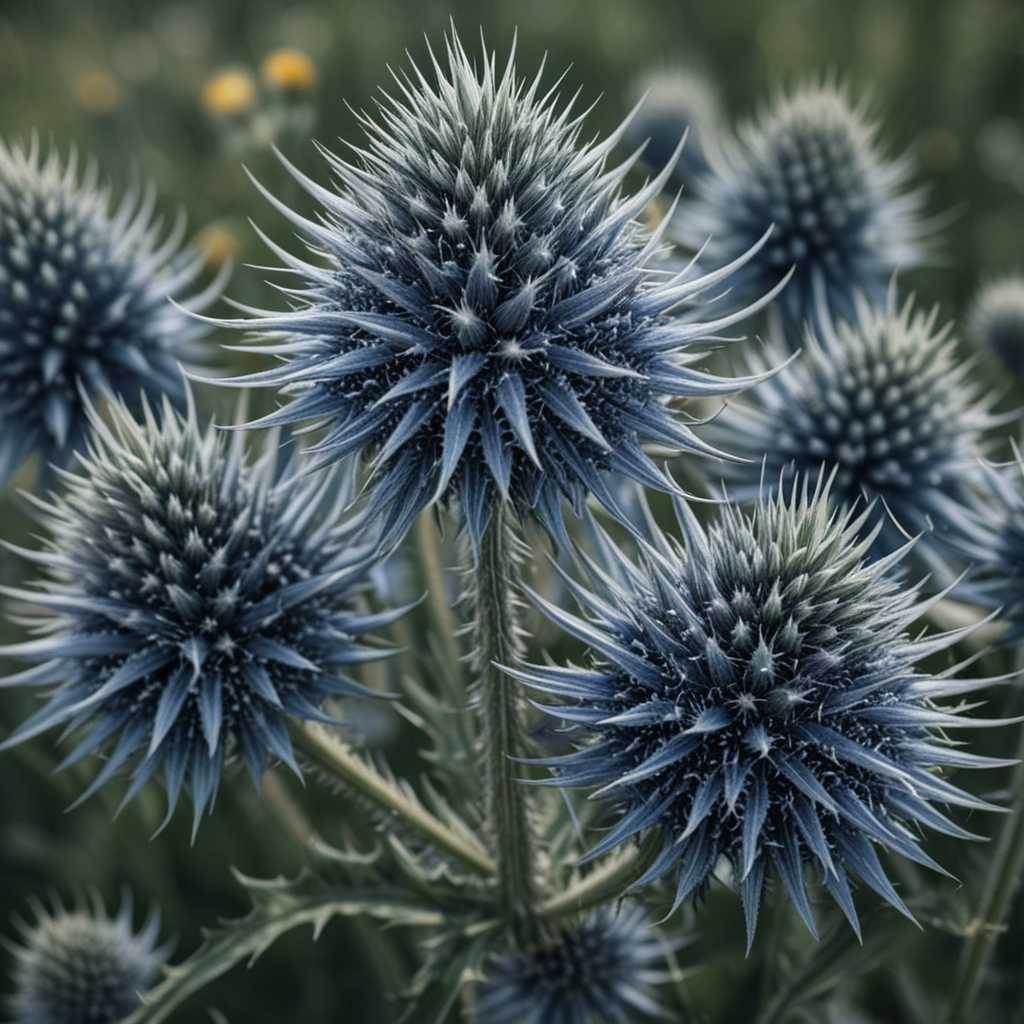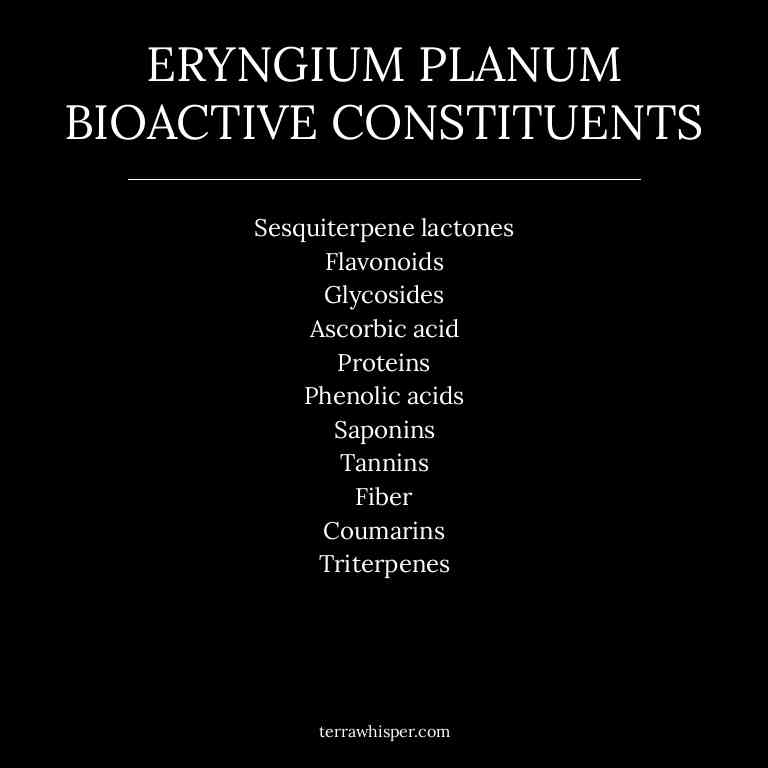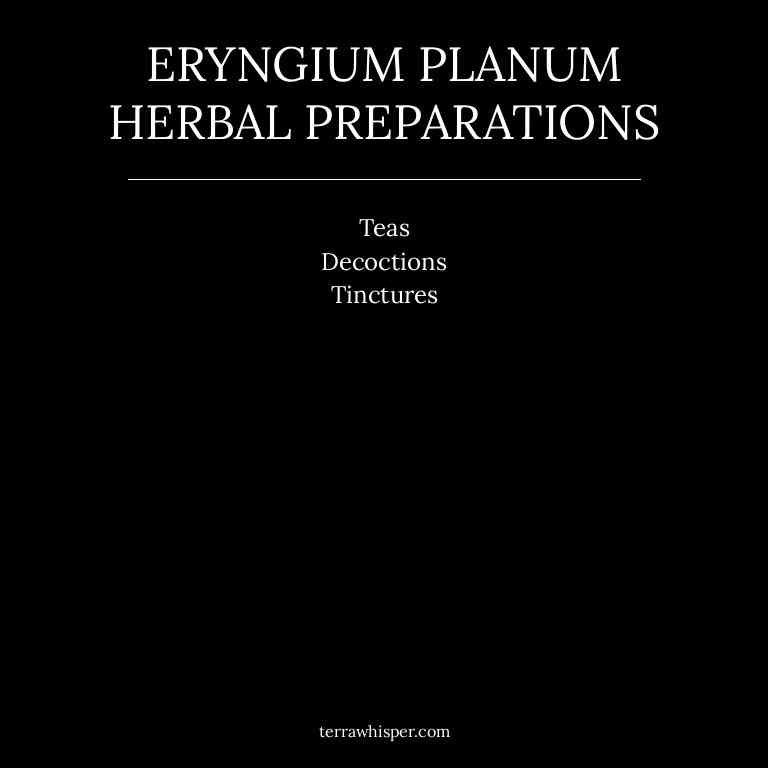Eryngium Planum Uses, Benefits, And Remedies

Eryngium planum, commonly known as the flat eryngo, is a flowering plant native to Europe and parts of Asia, belonging to the carrot family.
It is valued in traditional medicine for its anti-inflammatory, antispasmodic, and digestive benefits.
The herb contains bioactive constituents such as flavonoids, alkaloids, and essential oils, which contribute to its therapeutic actions.
Eryngium planum can be prepared as an infusion, tincture, or powder for use in herbal remedies.
This page analize the most important medicinal aspects of Eryngium planum.
- Health Benefits
- Bioactive Constituents
- Medicinal Parts
- Herbal Preparations
- Side Effects of eryngium planum
Health Benefits
Eryngium planum reduces inflammation by containing compounds like flavonoids and saponins that inhibit the production of pro-inflammatory cytokines and enzymes such as COX-2, thereby decreasing oxidative stress and cellular damage.
It soothes skin conditions due to its antimicrobial and anti-inflammatory properties, which help alleviate symptoms of eczema, psoriasis, and acne by reducing redness, itching, and bacterial infections. It supports bone health by promoting the activity of osteoblasts, the cells responsible for bone formation, and by providing essential minerals like calcium and magnesium that are crucial for maintaining strong and healthy bones. It improves wound healing through its ability to enhance collagen synthesis and stimulate the growth of new tissue, while also preventing infections with its natural antiseptic properties.
It eases joint pain by reducing inflammation in the synovial membranes and cartilage, which helps alleviate stiffness and discomfort associated with conditions like arthritis.
The 10 best health benefits of Eryngium planum are shown in the image below.

The list below give a brief description of the 10 best health benefits of Eryngium planum.
- Reduces Inflammation: Eryngium planum contains anti-inflammatory compounds that help reduce swelling and irritation in the body.
- Soothes Skin Conditions: The herb's natural properties can help alleviate symptoms of skin conditions like eczema and psoriasis.
- Supports Bone Health: It may contribute to stronger bones by promoting the absorption of essential minerals like calcium.
- Improves Wound Healing: Eryngium planum is believed to accelerate the healing process by promoting tissue regeneration and reducing infection risk.
- Eases Joint Pain: Its anti-inflammatory effects can help relieve discomfort associated with arthritis and other joint-related conditions.
- Boosts Immune System: The herb contains antioxidants and other bioactive compounds that strengthen the body's defense mechanisms against infections.
- Eases Muscle Spasms: Eryngium planum may help relax muscle tissues and reduce the frequency and intensity of spasms.
Bioactive Constituents
Eryngium planum sesquiterpene lactones are among the most significant bioactive compounds found in this herb, known for their potent anti-inflammatory and antitumor properties.
These compounds contribute to the plant's ability to modulate immune responses and inhibit the growth of cancer cells. In addition to sesquiterpene lactones, Eryngium planum contains flavonoids, which act as powerful antioxidants and may help protect cells from oxidative stress.
Glycosides present in the herb also play a role in its medicinal value, particularly in supporting cardiovascular health and reducing inflammation. Lastly, ascorbic acid, or vitamin C, enhances the herb's antioxidant capacity and supports overall immune function.
Together, these constituents make Eryngium planum a valuable source of natural compounds with diverse therapeutic applications.
The 11 best bioactive constituents of Eryngium planum are shown in the image below.

The list below give a brief description of the 10 best bioactive constituents of Eryngium planum.
- Sesquiterpene Lactones: These are a class of organic compounds known for their anti-inflammatory and antimicrobial properties, often found in various medicinal plants.
- Flavonoids: A group of plant-derived compounds with antioxidant properties, known to support cardiovascular health and reduce inflammation.
- Glycosides: Compounds consisting of a sugar molecule bonded to a non-sugar component, often responsible for medicinal effects in plants.
- Ascorbic Acid: Also known as vitamin C, it is an antioxidant that supports immune function and collagen synthesis.
- Proteins: Essential macronutrients involved in numerous bodily functions, including enzyme activity and immune response.
- Phenolic Acids: Natural compounds with antioxidant properties that help protect cells from damage caused by free radicals.
- Saponins: Plant compounds that have surfactant properties and are known for their antimicrobial and anti-inflammatory effects.
- Tannins: Polyphenolic compounds that have astringent properties and are used for their antimicrobial and antioxidant effects.
- Fiber: A type of carbohydrate that is indigestible and aids in digestion, promotes satiety, and supports gut health.
- Coumarins: A group of organic compounds with anticoagulant and anti-inflammatory properties, often found in certain plants.
- Triterpenes: A class of natural compounds with diverse biological activities, including anti-inflammatory and immunomodulatory effects.
Medicinal Parts
Eryngium planum flower, known for its unique spiky appearance, contains bioactive compounds that contribute to its medicinal properties.
The flower is often used in traditional medicine to treat ailments such as respiratory infections and skin conditions due to its anti-inflammatory and antimicrobial effects. It is also believed to have astringent properties that help in reducing excessive secretions and promoting wound healing.
The flower's essential oils, rich in flavonoids and terpenoids, are commonly extracted for use in herbal remedies and aromatherapy. In addition to the flower, the leaves and seeds of Eryngium planum are also utilized in herbal preparations. The leaves are known for their diuretic and antispasmodic qualities, while the seeds are valued for their potential to support digestive health and detoxification processes.
Overall, the various parts of Eryngium planum offer a range of therapeutic benefits, making it a valuable herb in both traditional and modern herbal medicine.
Herbal Preparations
Eryngium planum teas are traditionally prepared by steeping the dried leaves and flowers in hot water, creating a soothing beverage believed to support digestive health and reduce inflammation.
This herbal tea is often consumed in the morning or evening to promote relaxation and ease gastrointestinal discomfort. The preparation method involves using one teaspoon of dried herb per cup of water, allowing it to steep for 10 to 15 minutes to extract its active compounds.
Decoctions of Eryngium planum, which involve boiling the plant material for a longer period, are used to release more potent compounds, particularly for addressing more severe digestive issues. Tinctures made from Eryngium planum are concentrated extracts, typically prepared by soaking the herb in alcohol, and are used for their purported anti-inflammatory and antimicrobial properties.
These preparations are commonly used in traditional medicine to support overall wellness, though their efficacy should be evaluated with the guidance of a healthcare professional.
The 10 best herbal preparations of Eryngium planum are shown in the image below.

The list below give a brief description of the 10 best herbal preparations of Eryngium planum.
- Teas: Eryngium planum teas are traditionally used to support digestive health and alleviate symptoms of indigestion and bloating due to their mild carminative properties.
- Decoctions: Eryngium planum decoctions are valued for their potential anti-inflammatory and astringent effects, often used to address skin conditions and gastrointestinal discomfort.
- Tinctures: Eryngium planum tinctures are concentrated preparations used to harness the herb's potential antimicrobial and tonic properties, supporting overall wellness and immune function.
Side Effects of eryngium planum
Eryngium planum results in throat irritation, which can manifest as a persistent soreness or a burning sensation in the throat, potentially leading to difficulty swallowing.
This herb may also trigger allergic reactions in sensitive individuals, causing symptoms such as hives, itching, or even anaphylaxis in severe cases. Eye irritation is another possible side effect, with users reporting redness, tearing, or a gritty feeling in the eyes after exposure.
Skin irritation and rash are commonly reported, often appearing as redness, blisters, or itching, particularly with direct contact. Additionally, Eryngium planum may cause digestive upset, including stomach aches, nausea, and vomiting, while some individuals experience dizziness or respiratory issues like coughing or shortness of breath. These side effects highlight the importance of caution when using this herb, especially for those with pre-existing allergies or sensitivities.
It is advisable to consult a healthcare professional before incorporating Eryngium planum into one’s routine to mitigate potential adverse effects.
The 13 most common side effects of Eryngium planum are shown in the image below.

The list below give a brief description of the 13 most common side effects of Eryngium planum.
- Results In Throat Irritation: Eryngium planum may irritate the throat lining, causing discomfort or a burning sensation.
- Triggers Allergic Reaction: Individuals with allergies may experience an allergic reaction upon exposure to Eryngium planum.
- Causes Eye Irritation: Contact with Eryngium planum can lead to eye irritation, redness, and discomfort.
- Causes Skin Irritation: Handling Eryngium planum may cause skin irritation, including redness and itching.
- Triggers Respiratory Issues: Inhalation of Eryngium planum particles may trigger respiratory problems such as coughing or shortness of breath.
- May Induce Skin Rash: Eryngium planum can cause a rash on the skin, often accompanied by redness and inflammation.
- Causes Throat Swelling: In some cases, Eryngium planum may lead to throat swelling, which can be severe and potentially life-threatening.
- May Induce Skin Itching: Exposure to Eryngium planum may result in skin itching, a common allergic response.
- Leads To Stomach Ache: Consuming Eryngium planum may cause stomach pain or discomfort due to its irritant properties.
- May Cause Eye Redness: Eryngium planum can cause redness in the eyes, often as a result of irritation or allergic reaction.
- Causes Digestive Upset: Eryngium planum may lead to digestive upset, including bloating or discomfort in the gastrointestinal tract.
- May Cause Dizziness: In some cases, exposure to Eryngium planum may lead to feelings of dizziness or lightheadedness.
- Leads To Nausea Vomiting: Eryngium planum can cause nausea and vomiting, especially when ingested or inhaled in large quantities.